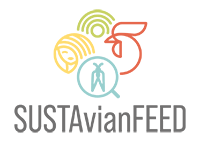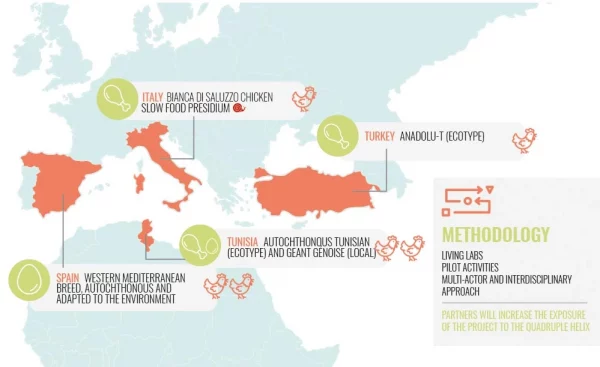SUSTAVIANFEED PILOTS
Five Pilots
Five pilots will demonstrate the innovative poultry feeding approach in order to obtain sustainable products. The pilot activities will be developed in four different regions of the Mediterranean area:
Which perfectly complement each other, as they share similarities in terms of climate and environment, but also remarkable differences not only in the type of farming systems, but also regarding socio-economic aspects.
They will combine the production of meat and eggs.
- In egg-type laying hen pilots the egg production (number and weight) and the quality of the eggs (both external, internal and nutritional traits) will be evaluated.
- In meat-type chicken pilots’ growth and slaughtering performance will be recorded. On a representative number of bird’s samples of meat (breast and drumstick) will be taken for meat quality assessment.
All the pilot process implementation will be followed by social, environmental and economic analysis. Furthermore, nutritional value of the diet and final product quality and microbioma analysis will be performed.
| Poultry breeds | Products | Expected result | |
| Tunisia (ISA-CM) |
Autochthonous Tunisian (ecotype) | Meat and eggs | The pilots to be implemented by universities will address the development of poultry products by the inclusion of a sustainable poultry diet in order to reduce the environmental impact drastically. Safety, nutritional, health and animal welfare, as well as environmental, economic and social evaluation will be performed in order to evaluate all the different opportunities that project approach offers. |
| Spain (UMU) |
Western Mediterranean breed, autochthonous and adapted to the environment. For example: Andaluzas, Levantinas or Castellana (local) | Eggs | |
| Turkey (EGE) |
Anadolu-T (ecotype) | Meat | |
| Italy (UNITO) |
Preferably Bianca di Saluzzo breed, which is Slow Food Presidia | Meat | |
| Tunisia (Rayhana) |
Geant Génoise (local) | Meat and eggs | In addition to the previous results, this pilot will result in the development of socioeconomic opportunities for women in a North-African rural context |
| EGG-TYPE | MEAT-TYPE chicken | ||
| In egg-type laying hen pilots the egg production (number and weight) and the quality of the eggs (both external, internal and nutritional traits) will be evaluated. | In meat-type chicken pilots’ growth and slaughtering performance will be recorded. On a representative number of bird’s samples of meat (breast and drumstick) will be taken for meat quality assessment. | ||
| All the pilots developed in universities will share the same basal experimental design regarding the feeding program as follows: 1) a standard commercial diet; 2) a diet including local ingredients or by-products and less soybean meal (LOC) and the inclusion of 5% dehydrated insect larvae (DIL); 3) LOC and 10% DIL. The basal diet will be formulated according to the type of chicken faming (egg type or meat type). | |||
| All pilots will also share some evaluations over the whole experimental period, namely: mortality rate, feed consumption and body weight will be recorded. Welfare assessment will be carried out by both haematological (i.e. H/L ratio) and behavioural (i.e. ethogram). During the experimental period at least two representative faecal sample will be taken to evaluate the evolution of faecal microbiota. At the end of the breeding cycle ceacal microbiota and microbioma will be evaluated. Samples of different gut segment (duodenum, jejunum, ileum) and other organs (liver, spleen, thymus, bursa of Fabricious) will be processed for histological evaluation. | |||
| RAYHANA pilot will be focused in social aspects and the empowerment of rural women, while scientific protocols and assessments will be adapted to the characteristics of the rural context. | |||
All the pilot process implementation will be followed by social, environmental and economic analysis. Furthermore, nutritional value of the diet and final product quality and microbioma analysis will be performed.
| Poultry breeds | |
| Tunisia (ISA-CM) |
Autochthonous Tunisian (ecotype) |
| Spain | Western Mediterranean breed, autochthonous and adapted to the environment. For example: Andaluzas, Levantinas or Castellana (local) |
| Turkey (EGE |
Anadolu-T (ecotype) |
| Italy (UNITO |
Preferably Bianca di Saluzzo breed, which is Slow Food Presidia |
| Tunisia (Rayhana) |
Geant Génoise (local) |
| Products | |
| Tunisia (ISA-CM |
Meat and eggs |
| Spain (UMU) |
Eggs |
| Turkey (EGE) |
Meat |
| Italy (UNITO) |
Meat |
| Tunisia (Rayhana) |
Meat and eggs |
| Expected result | |
| Turkey (EGE) |
The pilots to be implemented by universities will address the development of poultry products by the inclusion of a sustainable poultry diet in order to reduce the environmental impact drastically. Safety, nutritional, health and animal welfare, as well as environmental, economic and social evaluation will be performed in order to evaluate all the different opportunities that project approach offers. |
| Spain (UMU) |
|
| Turkey (EGE) |
|
| Italy (UNITO) |
|
| Tunisia (Rayhana) |
In addition to the previous results, this pilot will result in the development of socioeconomic opportunities for women in a North-African rural context |
| EGG-TYPE | MEAT-TYPE chicken |
| In egg-type laying hen pilots the egg production (number and weight) and the quality of the eggs (both external, internal and nutritional traits) will be evaluated. | In meat-type chicken pilots’ growth and slaughtering performance will be recorded. On a representative number of bird’s samples of meat (breast and drumstick) will be taken for meat quality assessment. |
| All the pilots developed in universities will share the same basal experimental design regarding the feeding program as follows: 1) a standard commercial diet; 2) a diet including local ingredients or by-products and less soybean meal (LOC) and the inclusion of 5% dehydrated insect larvae (DIL); 3) LOC and 10% DIL. The basal diet will be formulated according to the type of chicken faming (egg type or meat type). | |
| All pilots will also share some evaluations over the whole experimental period, namely: mortality rate, feed consumption and body weight will be recorded. Welfare assessment will be carried out by both haematological (i.e. H/L ratio) and behavioural (i.e. ethogram). During the experimental period at least two representative faecal sample will be taken to evaluate the evolution of faecal microbiota. At the end of the breeding cycle ceacal microbiota and microbioma will be evaluated. Samples of different gut segment (duodenum, jejunum, ileum) and other organs (liver, spleen, thymus, bursa of Fabricious) will be processed for histological evaluation. | |
| RAYHANA pilot will be focused in social aspects and the empowerment of rural women, while scientific protocols and assessments will be adapted to the characteristics of the rural context. | |







